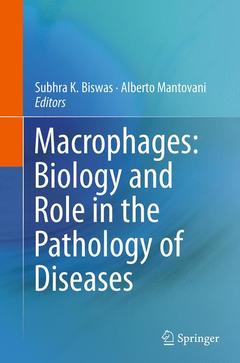Macrophages: Biology and Role in the Pathology of Diseases, Softcover reprint of the original 1st ed. 2014 Biology and Role in the Pathology of Diseases
Coordonnateurs : Biswas Subhra K., Mantovani Alberto

Macrophages are a key component of the innate immune system and play an integral role in host defense and homeostasis. On one hand, these cells contribute to host defence by triggering inflammation, displaying microbicidal/tumoricidal properties, regulating the activation of adaptive immunity and promoting resolution of inflammation. On the other hand, they contribute to essential trophic functions such as neural patterning, bone morphogenesis and ductal branching in mammary glands. Thus, macrophages are extremely versatile cells that can respond efficiently to tissue micro environmental cues by polarizing to distinct phenotypes, depending on the functions they need to perform. Indeed, functional diversity and plasticity are hallmarks of these cells.
Macrophages may also play a detrimental role. An overwhelming body of literature has indicated their crucial role in pathogenesis. The list includes sepsis, cancer, metabolic syndrome, immunodeficiency, auto-immune disease-virtually impacting every major pathology that we know. These observations have suggested macrophages and their related molecules as potential targets in therapeutic applications. Available evidence proclaims macrophages as a key player in homeostasis, host defense and disease. Crucial developments in the past few years call for a re-evaluation and update of our understanding of macrophages. The present book is an endeavour that attempts provide state-of-the art knowledge of these cells in health and disease.
Part I Macrophage: Origin, Activation And Polarization.- Blood monocytes and their subsets in health and disease.- Polarized activation of macrophages.- Alternative activation of macrophages: concepts and prospects.- Regulatory macrophages and the maintenance of homeostasis.- Part II Macrophages And Their Diverse Functions.- Phagocytosis.- The antimicrobial functions of macrophages.- Vascular modulatory functions of macrophages.- Part III Macrophages In Different Tissues.- Airway macrophages: sentinels of health.- Microglial ontogeny and functions in shaping brain circuits.- Kupffer cells in health and disease.- Intestinal Macrophages: Specialized antigen-presenting cells at the front line.- Part IV Macrophages In Pathology.- The wound macrophage - Macrophages and the entrance of resolution phase lipid mediators.- Macrophages in sepsis progression.- Adaptive characteristics of innate immune responses in macrophages.- African trypanosomiasis as paradigm for involvement of the mononuclear phagocyte system in pathogenicity during parasite infection.- Macrophages in obesity and insulin resistance.- Macrophages govern the progression and termination of inflammation in atherosclerosis and metabolic diseases.- Myelomonocytic subsets in tumor microenvironment.- Tumor associated macrophages.- Part V Transcriptional And Epigenetic Mechanisms.- Role of NF-kB activation in macrophages.- Interferon Regulatory Factors: Role in transcriptional regulation of macrophage plasticity and activation.- Kruppel-like factors in Monocyte-Macrophage Biology.- Regulation of macrophage polarization by the STAT-SOCS signaling axis.- Functions of the large Maf transcription factors and macrophages.- The Control of Gene Expression in Macrophages.- Role of microRNA in macrophage activation and polarization.- Part VI Systems Biology Of Macrophages.- The macrophage transcriptome.- Omics approaches in macrophage biology.- Appendix.
Alberto Mantovani was born in Milan in 1948. He graduated (summa cum laude) in 1973 in Medicine at the University of Milan and in 1976 he specialized in Oncology at the University of Pavia. Since 2001 he is full Professor of General Pathology, School of Medicine, State University of Milan. Since October 2005 he is Scientific Director of Istituto Clinico Humanitas, Milan, Italy and President and founder of the Fondazione Humanitas per la Ricerca. In addition, the discovery that pro- and anti- inflammatory signals not only regulate the level of chemokine production but also the level of receptions offers a new level of understanding of how the system functions and possible targets for therapeutic interventions. Finally, his group has cloned the PTX3 (cDNA and genome, human and mouse), the first member of the long pentraxin family and defined his function in innate immunity and inflammation.
Dr. Biswas was born in Kolkata, India in 1973. He completed his Ph.D. in Biotechnology (Cellular Immunology) in 2002, working on macrophage biology under Prof. A. Sodhi at Banaras Hindu University, India. Thereafter, he was a postdoctoral visiting scientist at the Istituto di Ricerche Farmacologiche "Mario Negri", Milan (Italy) working in the group of Prof. A. Mantovani and A. Sica. During this period, he was awarded a fellowship of the Alfredo Leonardi and G. Pfeiffer Foundation (2003). His principal research contribution includes the first molecular characterization of tumor associated macrophages. In 2005, he joined the Bioinformatics Institute (A*STAR) in Singapore as Research Scientist (In-Charge) of the Cell Interaction group, before moving to Singapore Immunology Network (SIgN), A*STAR in 2007 to head the Human Innate Immunity lab. Dr. Biswas is also an adjunct associate professor in the Department of Microbiology, Yong Loo Lin School of Medicine, National University of Singapore and Lee Kong Chian School of Medicine,Nanyang Technological University, Singapore. <
Ouvrage de 615 p.
15.5x23.5 cm
Ouvrage de 615 p.
15.5x23.5 cm
Thèmes de Macrophages: Biology and Role in the Pathology of Diseases :
Mots-clés :
disease; homeostasis; immune system; inflammation; macrophages; microenvironment; antibodies



